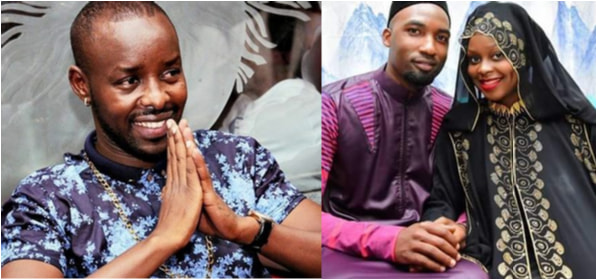Remah Namakula says she needs permission from Hamza Ssebunya

Singer Remah Namakula has said she will first seek permission from husband Dr Hamza Ssebunya to allow their daughter Aamal Musuza to visit the biological father Edrisa Musuza aka Eddy Kenzo.
This followed a stand off between the two separated lovers, who recently exchanged not good word, after Ssemyekozo implored to visit her daughter.
“I will have to first sit with my husband Dr. Hamza Ssebunya and we decide when Eddy Kenzo can meet our daughter Aamal,” Remah told journalists.
She further asserted, “I know Kenzo is Aamal’s father, but I have to first ask permission from my husband, because I am now a married woman, someone’s wife who can’t just meet strangers, without informing my lovely husband,” Remah boasted.
The Children Act 1997 is the main Ugandan law that provides for the care, protection and maintenance of children. … It states further, “Any person having custody of a child shall protect the child from discrimination, violence, abuse and neglect.
The Constitution of the Republic of Uganda stipulates that a child is a person below the age of eighteen years. A child is entitled to live with his or her parents or guardians unless it is not in the interest of the child whereof the best substitute care available shall be provided for the child.
Among a child’s rights include the right to education and guidance, clothing shelter, food, protection from discrimination, violence, abuse and neglect, harmful social or customary practices and employment in any activity that is harmful to his or her development.
The general rules governing the rights of the children regarding who to live with is that both parents have a right to live with their children and bring them up. However, where parents live apart, unmarried or divorced or one or both parents are dead, the question is who is entitled to the custody of the child?
Today in Uganda, it is increasingly becoming common to see single fathers looking after their children single handedly. Gone are the days when it was automatically assumed that a child is supposed to live and remain in sole custody of its mother.
The Children’s Act of Uganda, Cap 59, provided that the rights set out in the United Nations Convention on the Rights of the Child and the Organisation for African Unity (now the African Union) Charter on the Rights and Welfare of the African child with appropriate modifications to the circumstances are applicable in Uganda.
The 1st Schedule of the Children’s Act sets out certain basic principles that govern all parts of the Children’s Act, which must always be considered before any decision, or action concerning a child is made.
In the Ugandan legislation and courts of law, in determining who should have the custody, its well established that the paramount consideration is the welfare of the child.
It provides that the welfare principles and the Children’s rights as set out in the First schedule of the Children’s Act shall be the guiding principles in making any such decision.
The principles include: Time being of the essence, the ascertainable wishes and feelings of the child concerned.
Factors such as the father’s natural and superior right to the custody of the child as against the mother, the claims of the other relatives and the conduct of the parties among others, should be taken into account in determining the welfare of the child.
Consideration is also made of the child’s age and the child’s physical, emotional, and educational needs; the likely effects of any changes in the child’s circumstances, the child’s age, sex, background and any other circumstances relevant in the matter, any harm that the child has suffered or is at the risk of suffering where relevant, the capacity of the child, parents, guardians or others involved in the care of the child in meeting his or her needs but where a child is taken away from one of the parents, the other should be free to visit the child as he pleases.

